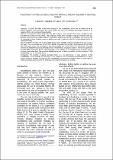| dc.contributor.author | Lakati, AS | |
| dc.contributor.author | Makokha, OA | |
| dc.contributor.author | Binns, CW | |
| dc.contributor.author | Kombe, Y | |
| dc.date.accessioned | 2022-02-01T10:00:39Z | |
| dc.date.available | 2022-02-01T10:00:39Z | |
| dc.date.issued | 2011-03-24 | |
| dc.identifier.citation | Lakati AS, Makokha OA, Binns CW, Kombe Y. The effect of pre-lacteal feeding on full breastfeeding in Nairobi, Kenya. East Afr J Public Health. 2010 Sep;7(3):258-62. doi: 10.4314/eajph.v7i3.64737. PMID: 21516965. | en_US |
| dc.identifier.other | DOI:10.4314/eajph.v7i3.64737 | |
| dc.identifier.uri | https://repository.amref.ac.ke/handle/123456789/560 | |
| dc.description.abstract | To assess the effect of pre-lacteal feeding on full breastfeeding in the first six months of life in selected hospitals, Nairobi Province. Pre-lacteal feeding has been internationally discouraged because of its negative effect on the duration of breastfeeding. A prospective cohort design was used with a sample of 692 mother-infant pairs recruited at birth and followed up until 6 months of age. The sample was drawn from five major hospitals in Nairobi. Data was analyzed using the SPSS computer software. Descriptive analysis was used on all variables. Chi-test was used for univariate analysis. Logistic regression analysis was used to determine the effect of pre-lacteal feeding on full breastfeeding. Slightly more than half (58.8%) of the mothers were formally employed and their mean age was 28.3 +/- 4.9 years. The mean income was KES 26,360 +/- 34,696. The mean birth weight of the infants was 3.24 +/- 0.43 kg and 53.3% were males. The prevalence of pre-lacteal feeding was 26.8% (95% CI 23.5%-30.1%). The most common pre-lacteal feeds used at all hospitals were infant formula and glucose solution. There were significant (P < 0.05) differences across the five study hospitals in this practice. In one hospital nearly all (93%) infants received a pre-lacteal feed. The use of pre-lacteal feeding was significant predictor for early cessation of full breastfeeding at 6, 10, 14 and 19 weeks. The practice of giving pre-lacteal feeds is a key determinant of early cessation of full breastfeeding. Some hospitals do not appear to be adhering to international recommendations on infant feeding. Polices to promote exclusive and full breastfeeding are necessary to enable infants to attain optimal health and lead to achievement of the Millennium Development Goals in our settings. | en_US |
| dc.description.sponsorship | Partially funded by the Directorate of Personnel Management-Kenya | en_US |
| dc.language.iso | en | en_US |
| dc.publisher | East African Journal of Public Health | en_US |
| dc.subject | Hospitals | en_US |
| dc.subject | Early cessation | en_US |
| dc.subject | Millennium Development Goals | en_US |
| dc.subject | Infant formula | en_US |
| dc.title | The Effect of Prelacteal feeding on Full breastfeeding in Nairobi. | en_US |
| dc.type | Article, Journal | en_US |

